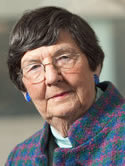Long-term adjustment of survivors of early-stage breast carcinoma, 20 years after adjuvant chemotherapy Journal Article
| Authors: | Kornblith, A. B.; Herndon, J. E. 2nd; Weiss, R. B.; Zhang, C.; Zuckerman, E.; Rosenberg, S.; Mertz, M.; Payne, D.; Massie, M. J.; Holland, J. F.; Wingate, P.; Norton, L.; Holland, J. C. |
| Article Title: | Long-term adjustment of survivors of early-stage breast carcinoma, 20 years after adjuvant chemotherapy |
| Abstract: | BACKGROUND. The long-term impact of breast carcinoma and its treatment was assessed in 153 breast carcinoma survivors previously treated on a Phase III randomized trial (Cancer and Leukemia Group B [CALGB 7581]) a median of 20 years after entry to CALGB 7581. METHODS. Survivors were interviewed by telephone using the following standardized measures: Brief Symptom Inventory (BSI), PostTraumatic Stress Disorder Checklist with the trauma defined as survivors' response to having had cancer (PCL-C), Conditioned Nausea, Vomiting and Distress, European Organization for Research and Treatment of Cancer QLQ-C30 (quality of life), Life Experience Survey (stressful events), MOS Social Support Survey, comorbid conditions (Older Americans Resources and Services Questionnaire), and items developed to assess long-term breast carcinoma treatment side effects and their interference with functioning. RESULTS. Only 5% of survivors had scores that were suggestive of clinical levels of distress (BSI), 15% reported 2 or more posttraumatic stress disorder (PTSD) symptoms (PCL-C) that were moderately to extremely bothersome, 1-6% reported conditioned nausea, emesis, and distress as a consequence of sights, smells, and tastes triggered by reminders of their treatment, 29% reported sexual problems attributed to having had cancer, 39% reported lymphedema, and 33%, reported numbness. Survivors who reported greater lymphedema and numbness that interfered with functioning had significantly worse PTSD (PCL-C; P = 0.008) compared with survivors who reported less lymphedema and numbness. Survivors with a lower level of education (P = 0.026), less adequate social support (P = 0.0033), more severe negative life events (P = 0.0098), and greater dissatisfaction with their medical care (P = 0.037) had worse PTSD compared with other survivors. CONCLUSIONS. Twenty years after the initial treatment, the impact of breast carcinoma on survivors' adjustment was minimal. However, the higher prevalence of PTSD symptoms in response to having had cancer is indicative of continuing psychologic sequelae long after treatment completion. Findings related to lymphedema and numbness and continued symptoms of PTSD suggest that the long-term psychologic and medical sequelae on adjustment may be underrecognized. To establish in more detail whether survivors' overall psychologic state is any different from that of individuals without cancer, a population of community residents without cancer would need to be studied. © 2003 American Cancer Society. |
| Keywords: | adult; cancer survival; controlled study; aged; middle aged; leukemia; patient satisfaction; major clinical study; prednisone; clinical trial; paresthesia; fluorouracil; cancer adjuvant therapy; methotrexate; cancer staging; follow up; follow-up studies; bcg vaccine; quality of life; controlled clinical trial; prevalence; cyclophosphamide; vincristine; breast neoplasms; hodgkin disease; survivors; lymphedema; social support; adaptation, psychological; sexual dysfunction; education; randomized controlled trials; breast carcinoma; comorbidity; scoring system; nausea and vomiting; posttraumatic stress disorder; interview; symptomatology; emotions; life event; socioeconomic factors; stress, psychological; adjustment; stress disorders, post-traumatic; humans; human; female; priority journal; article |
| Journal Title: | Cancer |
| Volume: | 98 |
| Issue: | 4 |
| ISSN: | 0008-543X |
| Publisher: | Wiley Blackwell |
| Date Published: | 2003-08-15 |
| Start Page: | 679 |
| End Page: | 689 |
| Language: | English |
| DOI: | 10.1002/cncr.11531 |
| PUBMED: | 12910510 |
| PROVIDER: | scopus |
| DOI/URL: | |
| Notes: | Export Date: 12 September 2014 -- Source: Scopus |
Altmetric
Citation Impact
BMJ Impact Analytics
Related MSK Work






